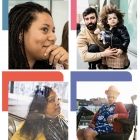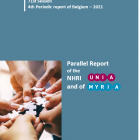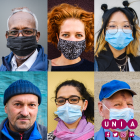Unia’s work expressed in figures for 2015
One of Unia's statutory tasks is to deal with "individual reports". Hence, anyone can contact Unia to ask a question, request an intervention, submit an observation or raise any other issue relating to anti-discrimination legislation or the fundamental rights of persons with disabilities, as provided for in the United Nations Convention on the Rights of Persons with Disabilities (CRPD).
.jpg)
Unia is legally competent to deal with:
- Discrimination, including direct and indirect discrimination, instructions to discriminate and harassment directly linked to the criteria specified in anti-discrimination legislation (see vocabulary); in the case of disability, this also includes a lack of reasonable accommodations.
- Hate speech (public expression of hate: incitement to hatred, discrimination or violence). This includes "cyber hate" (hate speech on the internet).
- Hate crimes motivated by hostility towards a person or a group owing to their origin, disability, sexual orientation or any other protected criteria.
If Unia considers itself competent to deal with a report, and if this report is more than a simple request for information, a file will be opened. It should be noted that a report or a file may involve only one criterion concerning discrimination or several of these criteria.
In 2015, Unia received 4,554 reports regarding potential discrimination, resulting in the opening of 1,596 files. This is a slight decrease compared with 2014. But in general, the figure has been on the rise since 2010.
Apart from areas within education, social issues and various activities, we have witnessed a fall in the number of files in other areas.
As was the case in 2014, the three main criteria were so-called "racial" criteria (38 % of all the files), disability (22 %) and religious or philosophical beliefs (19 %). This was followed by: age (5 %), sexual orientation (5 %), wealth (4 %), and state of health (4 %).
As was also the case in 2014, the three main areas concerning society were goods and services (24 % of all the files, including and especially accommodation), media (23 %, including and especially the internet), the labour market and work (22 %). This was followed by: education (11 %), social interaction (problems with neighbours or in the public space) (10 %) and the "various activities" sector, such as a cultural or sporting event, etc. (4 %).
Comparable publications
Annual report 2022

In 2022, Unia continued to fight on behalf of discriminated citizens. In our annual report, we look back at our efforts to combat discrimination and promote equality in Belgium.
Parallel report to the Committee for the Elimination of Discrimination against Women (CEDAW) (2022)
Did you know that 86% of family caregivers of people with disabilities are women? That the employment rate of women of foreign backgrounds is still lower than that of men, that they are more often employed in part-time jobs, with lower wages or in specific employment sectors, such as domestic help?
Parallel report to the Committee against torture (CAT) (2021)

Lack of reliable and centralized data on allegations of police violence, refoulement or deportation of foreigners despite the risk of torture and ill-treatment, and persistent shortcomings in the care of internees: these are some of the findings of this report.
Annual report 2020: vulnerable human rights in times of crisis

In this extraordinary year, Unia continued to fight for human rights and equality. The corona pandemic acted like a magnifying glass. Those already in a vulnerable position were often the first or hardest hit by Covid-19 or its measures.
